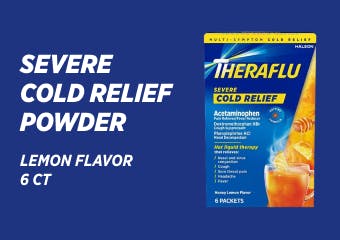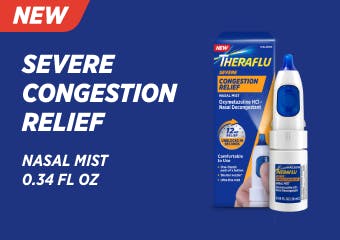What causes a sore throat?
A sore throat is most often caused by a viral infection, such as a cold or the flu. These usually are overrun by your immune system and resolve on their own. However, a less common but more serious type of sore throat caused by bacteria is called strep throat. This will require seeing a healthcare professional and treatment involving antibiotics.2
Some of the specific causes of sore throat include:6
- Viral infections such as the common cold, flu, mononucleosis, measles, chickenpox, COVID-19, or croup
- Bacterial infections like strep throat
- Allergies and the accompanying post-nasal drip
- Dry air
- Chemical or environmental irritants, such as air pollution, tobacco smoke, alcohol, spicy foods, or cleaning chemicals
- Muscle strain caused by yelling or talking loudly
- Gastroesophageal reflux disease, when stomach acid gets backed up into the esophagus and throat
Other, more serious infections or illnesses

However, a less common but more serious type of sore throat caused by bacteria is called strep throat. This will require seeing a healthcare professional and treatment involving antibiotics.2
What are different types of sore throat?
In addition to the specific causes of a sore throat, there are certain types of sore throat to look out for. These include:
- Pharyngitis – an upper respiratory infection caused by a virus
- Laryngitis – viral infection of the voice box
- Tonsilitis – inflammation or bacterial infection of the tonsils
- Epiglottitis – inflammation or bacterial infection of the epiglottis
- Uvulitis – inflammation or bacterial infection of the uvula
What are the symptoms of a sore throat?
Symptoms of a sore throat can vary, depending on the cause. Signs and symptoms might include:3
- Pain or a feeling of scratchiness in the throat
- Pain that gets worse with swallowing or drinking
- Difficulty swallowing
- Sore, swollen glands in your neck or jaw
- Swollen, red tonsils
- Hoarse or muffled voice
How do you treat a sore throat?
While nothing can immediately cure a cold, over-the-counter cold and flu medicines such as Theraflu can ease your severe symptoms and help you get back on your feet. Symptom relief, especially at night, can help you rest easier and in turn aid in recovery. If symptoms persist for longer than a week, it would be wise to consult your doctor.
A sore throat caused by a viral infection usually lasts about 5-7 days and should go away on its own. You can take the following measures to help alleviate some of the pain:
- Get plenty of rest
- Make sure to drink plenty of liquids to prevent dehydration
- Gargling with salt water or drinking warm liquids like tea or broth may also help ease any throat pain4,5
For more immediate relief, you can take:
- Ibuprofen, acetaminophen, or over-the-counter throat sprays
- Daytime Theraflu-D Flu Relief Max Strength + Nasal Decongestion syrup contains acetaminophen to effectively ease minor sore throat pain
- Beyond sore throat, Daytime Theraflu-D Flu Relief Max Strength + Nasal Decongestion syrup also treats nasal congestion, minor aches and pains, cough, fever, headache, and sinus pressure
Symptom relief, especially at night, can help you rest easier and in turn aid in recovery. If symptoms persist for longer than a week, it would be wise to consult your doctor.

When to see a doctor for sore throat
You should see your doctor not only if your sore throat symptoms persist, but also if your sore throat is accompanied by additional symptoms, including:6
- Trouble swallowing
- Trouble breathing
- Trouble opening your mouth
- Pain in the joints
- An earache
- A skin rash
- Fever over 101°F
- Frequent sore throats
- A lump in your neck
- Hoarse voice that lasts longer than two weeks
- Any swelling in the neck or face





